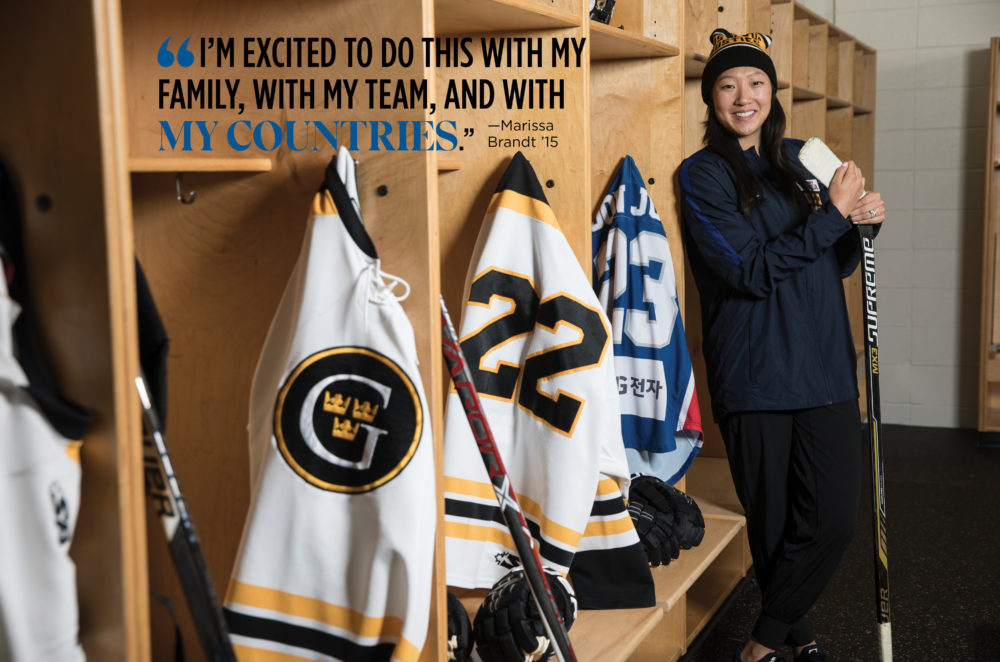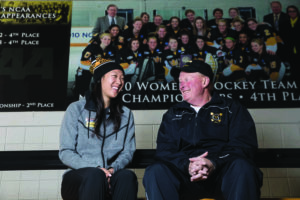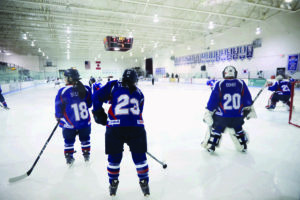
Marissa Brandt ’15 was number 22 on the Gustavus hockey team. On the Korean Olympic hockey team she is Yoon Jung Park, number 23. (Photos by Ackerman + Gruber)
It’s a story of Olympic proportions. A baby in Korea is adopted into a Minnesota family, grows up playing hockey, really good hockey, then returns to Korea to be a leading athlete on its Olympic team. It’s like the origin story of a Greek goddess.
It is Marissa Brandt’s story, and she’s likely embarrassed by that comparison. The gracious, hardworking Gustie greets old friends warmly, and new folks with a quickness to connect. In person, she’s the exact opposite of “goddess-like” (not counting her current level of physical fitness). Instead, she is completely down-to-earth.
“It was an easy decision. It is an amazing opportunity. I get to play hockey,” she says, summating her incredible story in that humble and straightforward way of hers. But press a bit and even she will admit there is more to it. She is a Minnesotan, a hockey player, a Gustie, and, now (as before) a Korean. Her story is one of identity, community, family, sport, and excellence. Despite her best efforts to downplay it, she really is something special.
She is former Gustavus hockey player Marissa Brandt. And she is current Korean national hockey player Yoon Jung Park. Come February, she will be an Olympian.
•
“When I was younger, I wanted nothing to do with Korea or being Korean,” Brandt says. She is in Lund Arena, quietly accepting her fate as an interviewee. She blushes when asked if she is a starter. (She is.) Brandt was adopted from Korea by Greg and Robin Brandt when she was four months old. The couple then became pregnant with her sister, Hannah. The sisters, only a year apart, did everything together. “We would actually go to Korean culture camp,” Brandt says. “I never wanted to go but my sister did.”
Both sisters loved hockey. They started playing in elementary school, played on the same teams and for Hill Murray High School, and went on to play in college. For sister Hannah, it was the University of Minnesota-Twin Cities. For Marissa, it was Gustavus. “I liked that it was a small school,” she says, “And of course the hockey program is great!”

Brandt on Gustavus Hockey Coach Mike Carroll: “From him I learned…to push through and work hard and see results.”
But it was a hard first year. “It was a rollercoaster of emotions. I sat a couple of games,” she says. She had to work to stay in the lineup. “She was a unique player in that she could play forward and defense, and she had great skating technique,” says Gustavus women’s hockey coach Mike Carroll. Plus, he says, “She had a gift that not many students have—she could talk to adults as well as her peers.” Says former assistant hockey coach Kirstin Peterson ’11, “She was a great communicator. She can change the culture of any situation.” A great relator, Brandt thrived in Kathi Tunheim’s human resources and organization behavior courses, and declared a management major. She also worked for women’s soccer coach Laura Burnett-Kurie. “She lived the life of an ideal student-athlete,” says Burnett- Kurie. “Marissa was committed to hockey, but she also got the big picture. She was trying to be the best in all aspects of her life.
“Really, the Olympics are just the next step in her process.”
•
“I wanted to get married, get a job, nothing crazy.” Brandt says of her life-after-Gustavus plan. But during her senior year, Rebecca Baker, an assistant hockey coach at Bethel, called. Baker was consulting for the South Korean national team as it prepared for the 2018 Winter Olympics. (As host country, Korea’s teams are granted automatic entry into this year’s Olympics.) Baker had seen Brandt play. Would Brandt consider trying out for the Korean national team? “I was terrified,” Brandt says. Everything that was wrong with the idea went through her head: She didn’t speak the language. She didn’t know a single person. Maybe the call was a prank. Plus, Brandt says, “I was so shy about being Korean. I really didn’t want to tap into that side of myself. “But I found myself saying yes right away.”
Within two weeks, Brandt was stepping off a 15-hour flight and into her birth country, one she’d not been back to since she was adopted from it. “It was so surreal. I never thought I’d be back to Korea under those circumstances,” she says.
It was a silent 90-minute car ride to the training center; she and the driver didn’t speak any of the same language. “I was crying nervous,” Brandt says. When she met her teammates for the first time, “They all bowed. I just bowed back! I thought, ‘How am I going to learn everyone’s names? How am I going to last here?’” The next day she met another English-speaking tryout from Canada. Later, teammates from Colorado and North Carolina joined in. In total, there are five “imports” with Korean ancestry on the Korean national team. Once their positions were established, “We decided the most important thing is to bring as much knowledge as we can,” Brandt says.
In general, Koreans don’t grow up playing hockey. There are only 200 registered players in Korea, says Brandt. Aspects of the game that American players and fans take for granted are growth areas there. “Even little things like jumping over the boards,” Brandt says. The team trains six hours a day—at least two hours in the gym, at least two hours on ice. The Gustavus student-athlete and culture-changer in Brandt has kicked in. “We made a community of our team. I wanted it to feel like it did at Gustavus,” she says. As a starting defensive player, a lifelong skater, and, at age 24, one of the oldest on the team, she is a clear leader. (The average age of the team is 20.) Her Korean teammates call her Mother Marissa and have soaked up as much knowledge about hockey as Brandt and the other imports can teach. In return, Brandt says, “They teach me Korean, and I learn about the culture.”
And that, she says, has been the truly transformative aspect of her remarkable story. “Tapping into my Korean self—that is the most important thing. I’ve been able to accept it.” Case in point: The moment in April when the Korean national team won Division IIA World Championships for the first time in history and were promoted to Division IB. Korea was hosting, so it was a win at home. Says Brandt, “We were lined up and watching the flag being raised. I was, literally, in that moment, so proud to be Korean. I wasn’t ashamed about it in anymore.
“I realized that it’s okay to be Korean and American. And I’m excited to do this with my family, with my team, and with my countries.” •
Opening Ceremonies of the Winter Olympics in PyeongChang, South Korea, are Feb. 9. Korea plays Switzerland on Feb. 10.
###
Media Contact: Director of Media Relations and Internal Communication Luc Hatlestad
luch@gustavus.edu
507-933-7510

To paraphrase “Crying proud” of Marissa and everything about Gustavus that was a part of her incredible journey.